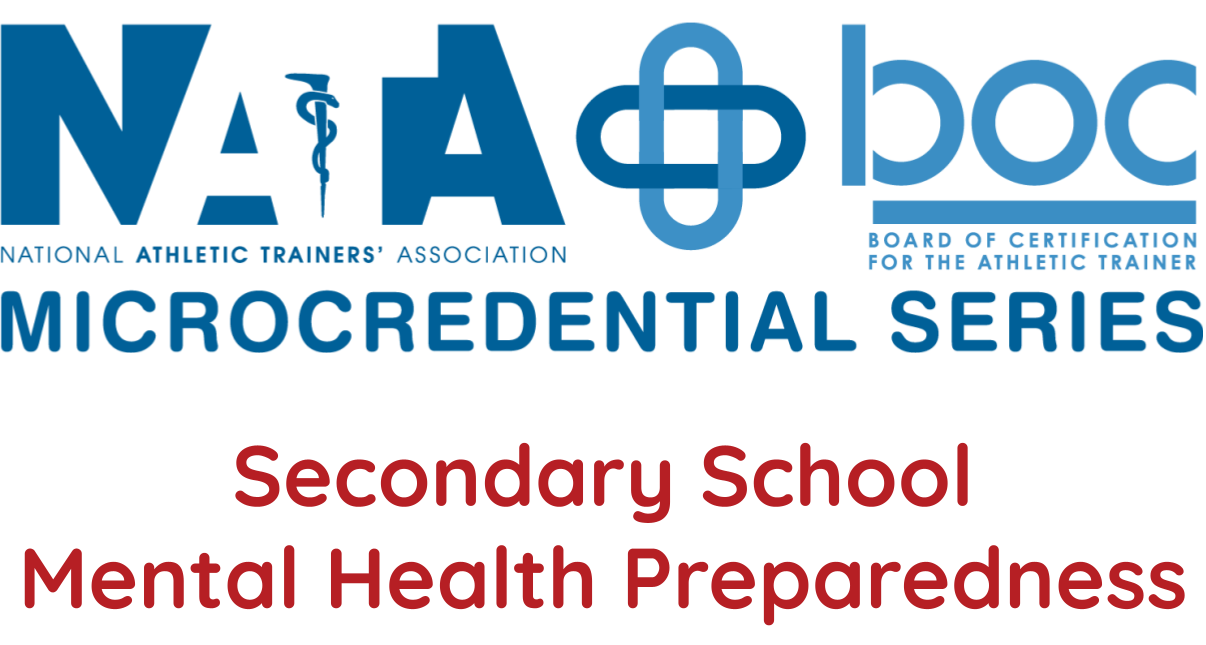
Module 7 - Self-Care and Support: Maintaining Athletic Trainer Mental Health
| ATs Care |
Abstract:
ATs Care provides peer-to-peer crisis support for athletic trainers facing the psychological impact of traumatic events. Accessible via the NATA website, ATs Care offers educational resources on critical incident stress management (CISM), training in psychological first-aid, and direct crisis intervention. The program's nationwide network of certified ATs delivers support through phone calls, on-site interventions, debriefings, and follow-ups. ATs can report incidents confidentially through an online form, ensuring rapid access to support when needed. Additional training, including CEUs, is available on NATA EducATe, equipping ATs to navigate crises and support each other effectively.
Learning Objectives:
- Describe the purpose of ATs Care and its role in supporting athletic trainers after traumatic events.
- Identify and access key resources, including CISM training, peer support, and reporting tools.
- Navigate the ATs Care website to utilize resources and prepare for critical incidents.
| Does the Mental Health and Well-Being of the Athletic Trainer Affect Patients? |
Abstract:
This editorial explores the impact of mental health and well-being on athletic trainers' ability to provide effective patient care. It highlights the stigma surrounding mental health within the profession, the pervasive risk of burnout, and its consequences, including emotional exhaustion, depersonalization, and medical errors. Additionally, the article emphasizes the need for a cultural shift toward destigmatizing mental health issues and advocating for self-care among healthcare providers. Despite recognizing these challenges, limited research exists on practical, evidence-based interventions to support mental health and mitigate burnout among athletic trainers. Addressing this gap could enhance both provider well-being and patient outcomes, ensuring more resilient and effective healthcare delivery in athletic settings.
Learning Objectives:
- Identify mental health challenges commonly faced by athletic trainers and their potential impact on personal and professional well-being.
- Recognize the importance of prioritizing self-care and seeking support to maintain mental health and resilience.
- Advocate for strategies to reduce mental health stigma and prevent burnout among athletic trainers.
Course Level:
Essential
Course Domain(s):
Domain 1: Risk Reduction Wellness and Health Literacy
Domain 2: Assessment Evaluation and Diagnosis
Domain 3: Critical Incident Management
Domain 4: Therapeutic Intervention y
Keywords:
ATs Care, Peer-to-Peer Crisis Support, Critical Incident Stress Management (CISM), Psychological First-Aid, Post-Traumatic Stress
Course Expiration:
This premium course offering must be completed within 12 months from the purchase date.
For full details, refer to the expiration policy on our FAQ page.
EJ Hairston, MS, LAT, ATC
E.J. Hairston is currently the Director of Sports Medicine for the Waxahachie Indians in Waxahachie, TX. Previously, he spent eight year as an associate athletic trainer at the University of North Texas. Hairston handled the daily operations of the athletic training room and worked primarily with men’s basketball, men’s golf and assisted with football. Prior to North Texas, Hairston worked at Stetson University and Western Carolina University as an assistant athletic trainer.
A native of Lexington, N.C., Hairston graduated from Greensboro College in 2000 with a bachelor’s degree in sport and exercise studies with an emphasis in athletic training. He later returned to school to complete his master’s degree in 2006 from North Carolina Central University in physical education with an emphasis in athletics administration. While completing his master’s degree, Hairston was an intern athletic trainer at North Carolina State University, working with softball in its inaugural campaign.
After completing his master’s degree, Hairston accepted his first full-time staff position as an assistant athletic trainer at Western Carolina University, where he worked with women’s soccer for two years. He then moved to Florida to work with baseball and men’s basketball at Stetson University. Also during his time there, he worked as the strength and conditioning coordinator for two years.

